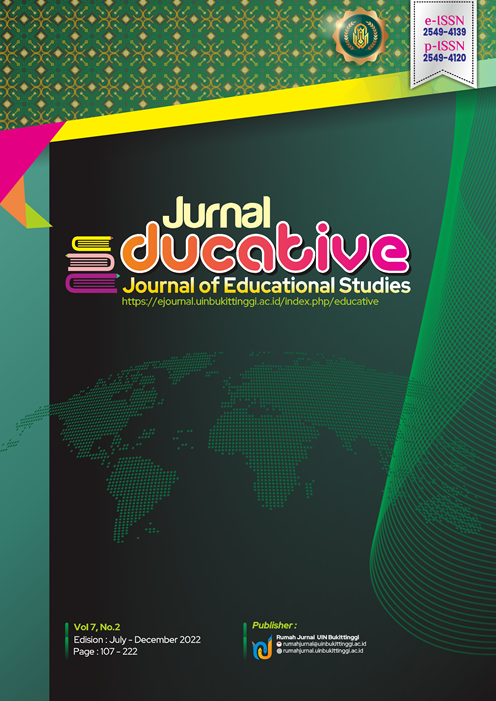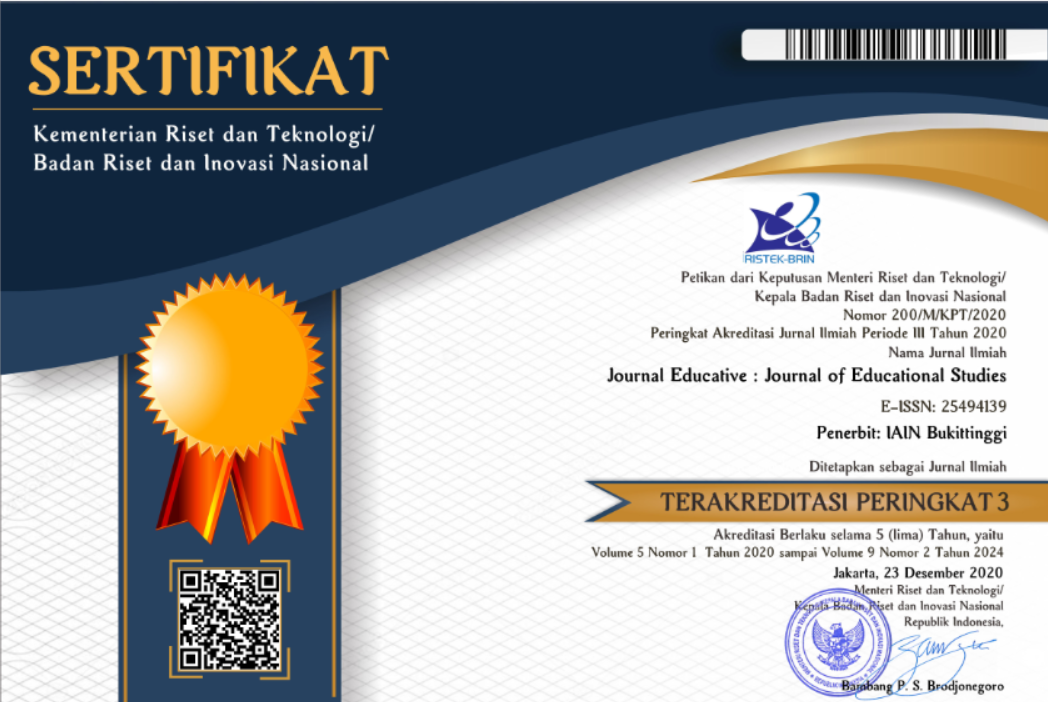Agriculture Students Perceptions Toward Native English-Speaking Teachers (NESTs) and Non-Native English-Speaking Teachers (NNESTs)
DOI:
https://doi.org/10.30983/educative.v7i2.5407Keywords:
Native English, Speaking Teachers (NEST), Non-Native English-Speaking Teachers (NNEST), PerceptionsAbstract
This study aims to reveal students' perceptions of Native English-Speaking Teachers (NEST) and Non-Native English-Speaking Teachers (NNEST). The study involved students from the Agriculture Faculty of the Riau State Islamic University. This is a quantitative research that employs a survey design. The examination of the data reveals that students had a good assessment of teachers who were either native or non-native speakers. On the other hand, students encountered difficulties when learning with native and non-native professors. Students believe that NEST and NNEST will be more effective if native speakers also study and understand their original language and culture. Instructors who are not natural English speakers should pursue additional education in countries where English is the primary language to hone their abilities. The ideal non-native teachers are those who have reached a level of English proficiency comparable to that of a native speaker. Assuming the talents of the non-native English instructor are optimal, the majority of students believe that as long as instructors display a high level of competence and professionalism, there should be no discrimination between native speakers and non-native English teachers. However, when properly prepared and competent, both native and non-native English teachers can increase the enthusiasm for the student's English skill development. Both have their advantages and disadvantages, and they should collaborate to aid students in becoming successful English learners.
References
Books
Brown, H. Douglas, Principles of Language Learning and Teaching, 5th edition (White Plains, NY: Pearson Education ESL, 2006)
Journals
Alseweed, Mohammad, ‘University Students’ Perceptions of the Influence of Native and Non-Native Teachers’, English Language Teaching, 5.12 (2012), p42 <https://doi.org/10.5539/elt.v5n12p42>
Arva, Valeria, and Péter Medgyes, ‘Native and Nonnative Teachers in the Classroom’, System, 28 (2000), 355–72 <https://doi.org/10.1016/S0346-251X(00)00017-8>
Astriyanti, Diah, Abdul Arif, and Desi Sri Astuti, ‘Ersepsi Siswa Terhadap Guru Bahasa Inggris Native Speaker Atau Native Speaker Dan Guru Bahasa Inggris Bukan Native Speaker Atau Non-Native Speaker’, Jurnal Pendidikan Bahasa, 4.1 (2015), 55–70 <https://doi.org/10.31571/bahasa.v4i1.39>
Dakhi, Saniago, and Tira Nur Fitria, ‘The Principles and the Teaching of English Vocabulary: A Review’, Journal of English Teaching, 5.1 (2019), 15–25 <https://doi.org/10.33541/jet.v5i1.956>
Duli, Nikolaus, Metodologi Penelitian Kuantitatif: Beberapa Konsep Dasar Untuk Penulisan Skripsi & Analisis Data Dengan SPSS (Deepublish, 2019)
Fitria, Tira Nur, ‘Lecturer’s Pedagogic Competence: Teaching English in Online Learning During Pandemic Covid-19’, Journal of English Education, 6.2 (2021), 100–108 <https://doi.org/10.31327/jee.v6i2.1569>
Grubbs, Samuel J., Vachira Jantarach, and Supamas Kettem, ‘Studying English with Thai and Nativeâ€speaking Teachers’, Teachers and Teaching, 16.5 (2010), 559–76 <https://doi.org/10.1080/13540602.2010.507966>
Hertel, Tammy Jandrey, and Gretchen Sunderman, ‘Student Attitudes Toward Native and Non-Native Language Instructors’, Foreign Language Annals, 42.3 (2009), 468–82 <https://doi.org/10.1111/j.1944-9720.2009.01031.x>
Kaur, Paramjit, and Arumugam Raman, ‘Exploring Native Speaker and Non-Native Speaker Accents: The English as a Lingua Franca Perspective’, Procedia - Social and Behavioral Sciences, The International Conference on Communication and Media 2014 (i-COME’14) - Communication, Empowerment and Governance: The 21st Century Enigma, 155 (2014), 253–59 <https://doi.org/10.1016/j.sbspro.2014.10.288>
Lasagabaster, David, and Juan Manuel Sierra, ‘University Students’ Perceptions of Native and Non-Native Speaker Teachers of English’, Language Awareness, 11.2 (2002), 132–42 <https://doi.org/10.1080/09658410208667051>
Medgyes, Péter, ‘Native or Non-Native: Who’s Worth More?’, ELT Journal, 46.4 (1992), 340–49 <https://doi.org/10.1093/elt/46.4.340>
———, ‘When the Teacher Is a Non-Native Speaker’, Teaching English as a Second or Foreign Language, 2001, 429–42
Mikhaleva, Lyubov V., and Jean-Claude Régnier, ‘Parallel Study of Native and Target-Language Cultures in Foreign Language Teaching’, Procedia - Social and Behavioral Sciences, THE XXV ANNUAL INTERNATIONAL ACADEMIC CONFERENCE, LANGUAGE AND CULTURE, 20-22 October 2014, 154 (2014), 118–21 <https://doi.org/10.1016/j.sbspro.2014.10.122>
Murtiana, Rahmila, ‘Student’s Perceptions of Native Speaker and Non-Native Speaker Teachers: Implication for Teacher Education’’, in Proceedings the 5th International Seminar: Teacher Education in the Era of World Englishes, 2011, pp. 29–42
Novianti, Alviaderi, ‘“Native Versus Non-Native English Speaking Teachers: An Insight Into Indonesian Students†Voices’’, Jurnal Pendidikan Bahasa Dan Sastra, 18.1 (2018), 44–57 <https://doi.org/10.17509/bs_jpbsp.v18i1.12145>
Pae, Tae-Il, ‘Effects of the Differences between Native and Non-Native English-Speaking Teachers on Students’ Attitudes and Motivation toward Learning English’, Asia Pacific Journal of Education, 37.2 (2017), 163–78 <https://doi.org/10.1080/02188791.2016.1235012>
Qiu, Xuyan, and Chang Fang, ‘Creating an Effective English-Medium Instruction (EMI) Classroom: Chinese Undergraduate Students’ Perceptions of Native and Non-Native English-Speaking Content Teachers and Their Experiences’, International Journal of Bilingual Education and Bilingualism, 2019 <https://www.tandfonline.com/doi/abs/10.1080/13670050.2019.1707769> [accessed 16 December 2022]
Rao, Zhenhui, ‘Chinese Students’ Perceptions of Native English-Speaking Teachers in EFL Teaching’, Journal of Multilingual and Multicultural Development, 31.1 (2010), 55–68 <https://doi.org/10.1080/01434630903301941>
Şahin, İsmet, ‘The Effect of Native Speaker Teachers of English on the Attitudes and Achievement of Learners’, Journal of Language and Linguistic Studies, 1.1 (2005), 29–42
Schnitzer, Eve, ‘English as an International Language: Implications for Interculturalists and Language Educators’, International Journal of Intercultural Relations, 19.2 (1995), 227–36 <https://doi.org/10.1016/0147-1767(95)00006-W>
Sung, Chit Cheung Matthew, ‘An Exploratory Study of Hong Kong Students’ Perceptions of Native and Non-Native English-Speaking Teachers in ELT’, Asian Englishes, 16.1 (2014), 32–46 <https://doi.org/10.1080/13488678.2014.880252>
Tosuncuoglu, İrfan, ‘Non-Native & Native English Teachers’, Journal of History Culture and Art Research, 6.6 (2017), 634–38 <https://doi.org/10.7596/taksad.v6i6.573>
Tsou, Shih-Yun, and Yingling Chen, ‘Taiwanese University Students’ Perceptions toward Native and Non-Native English-Speaking Teachers in EFL Contexts’, International Journal of Teaching and Learning in Higher Education, 31.2 (2019), 176–83 <https://eric.ed.gov/?id=EJ1224432> [accessed 31 December 2022]
Ãœstünlüoglu, Evrim, ‘University Students’ Perceptions of Native and Nonâ€native Teachers’, Teachers and Teaching: Theory and Practice, 2007 <https://doi.org/10.1080/13540600601106096>
Walkinshaw, Ian, and Duongthi Hoang Oanh, ‘Native and Non-Native English Language Teachers: Student Perceptions in Vietnam and Japan’, SAGE Open, 4.2 (2014), 2158244014534451 <https://doi.org/10.1177/2158244014534451>
———, ‘Native and Non-Native English Language Teachers: Student Perceptions in Vietnam and Japan’, SAGE Open, 4.2 (2014), 2158244014534451 <https://doi.org/10.1177/2158244014534451>
Zakariah, Kh M., M. Askari Zakariah, and Vivi Afriani, Metodologi Penelitian Kualitatif, Kuantitatif, Action Research, Research and Development (R&D) (Yayasan Pondok Pesantren Al Mawaddah Warrahmah Kolaka, 2021) <http://repo.iainbatusangkar.ac.id/xmlui/handle/123456789/22510> [accessed 31 December 2022]
Zakariah, M. Askari, Vivi Afriani, and KH M. Zakariah, Metodologi Penelitian Kualitatif, Kuantitatif, Action Research, Research and Development (R&D) (Yayasan Pondok Pesantren Al Mawaddah Warrahmah Kolaka, 2020)
Downloads
Published
How to Cite
Issue
Section
Citation Check
License
Copyright (c) 2022 Fitria Wulandari, Tira Nur Fitria, Adelina Maryanti

This work is licensed under a Creative Commons Attribution-ShareAlike 4.0 International License.
Authors who publish with this journal agree to the following terms:
1. Authors retain copyright and grant the journal right of first publication with the work simultaneously licensed under a Creative Commons Attribution License that allows others to share the work with an acknowledgment of the work's authorship and initial publication in this journal.
2. Authors are able to enter into separate, additional contractual arrangements for the non-exclusive distribution of the journal's published version of the work (e.g., post it to an institutional repository or publish it in a book), with an acknowledgment of its initial publication in this journal.
3. Authors are permitted and encouraged to post their work online (e.g., in institutional repositories or on their website) prior to and during the submission process, as it can lead to productive exchanges, as well as earlier and greater citation of published work (See The Effect of Open Access).




